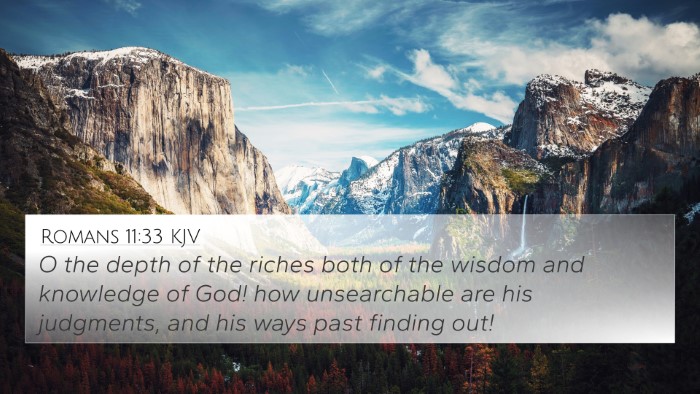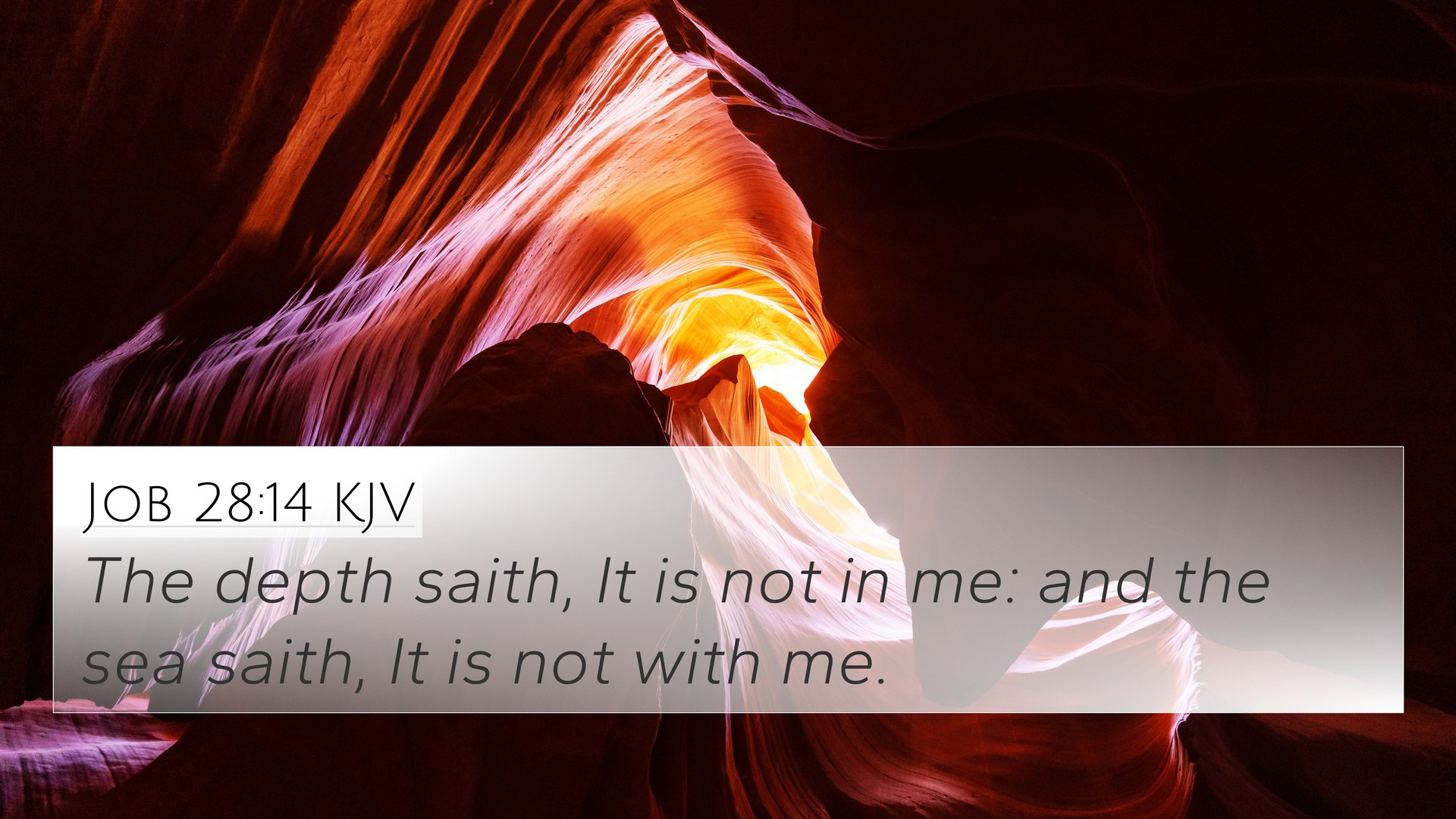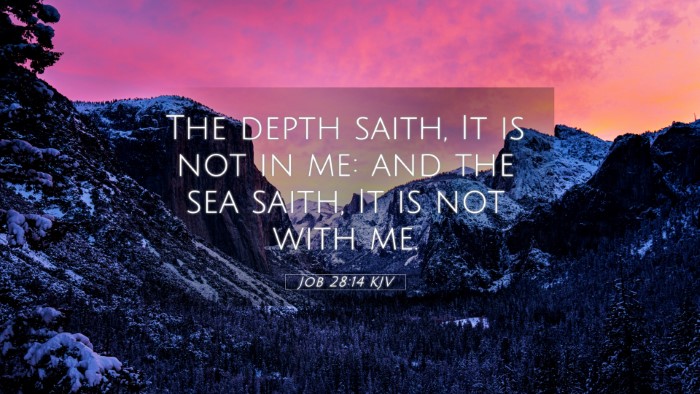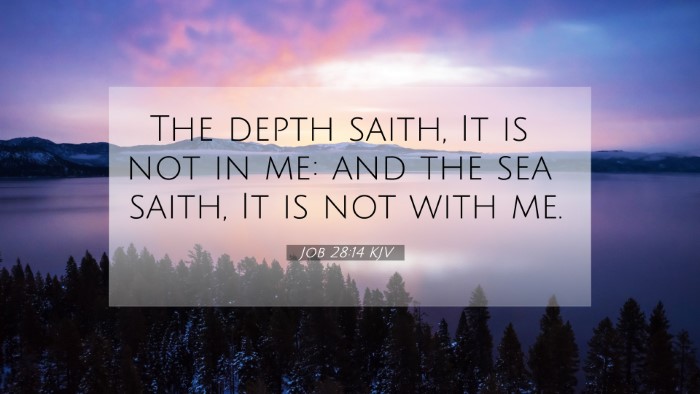Old Testament
Genesis Exodus Leviticus Numbers Deuteronomy Joshua Judges Ruth 1 Samuel 2 Samuel 1 Kings 2 Kings 1 Chronicles 2 Chronicles Ezra Nehemiah Esther Job Psalms Proverbs Ecclesiastes Song of Solomon Isaiah Jeremiah Lamentations Ezekiel Daniel Hosea Joel Amos Obadiah Jonah Micah Nahum Habakkuk Zephaniah Haggai Zechariah MalachiJob 28:14 Similar Verses
Job 28:14 Cross References
The depth saith, It is not in me: and the sea saith, It is not with me.
Uncover the Rich Themes and Topics of This Bible Verse
Listed below are the Bible themes associated with Job 28:14. We invite you to explore each theme to gain deeper insights into the Scriptures.
Job 28:14 Cross Reference Verses
This section features a detailed cross-reference designed to enrich your understanding of the Scriptures. Below, you will find carefully selected verses that echo the themes and teachings related to Job 28:14 KJV. Click on any image to explore detailed analyses of related Bible verses and uncover deeper theological insights.

Romans 11:33 (KJV) »
O the depth of the riches both of the wisdom and knowledge of God! how unsearchable are his judgments, and his ways past finding out!
Job 28:14 Verse Analysis and Similar Verses
Understanding Job 28:14
Job 28:14 states: "The depth saith, It is not in me: and the sea saith, It is not with me." In this verse, Job speaks about the elusiveness of wisdom and understanding. Public domain commentaries provide various insights into this profound statement, highlighting its theological and philosophical implications.
Job 28 marks a critical point in the dialogue where Job reflects on the nature of wisdom. It is essential to recognize that this chapter represents a poetic interlude—an exploration of where wisdom can be found and how it is perceived by humanity.
Meaning and Interpretation
The verse emphasizes that neither the depths of the earth (often associated with material wealth) nor the vastness of the sea (symbolizing the overwhelming nature of life’s challenges) possesses true wisdom. This points to the idea that human understanding does not naturally reside in earthly or material realms, aligning closely with the teachings found elsewhere in the Scriptures.
Insights from Commentaries
- Matthew Henry: Henry notes that the depths and seas symbolize the limits of human knowledge. He emphasizes that while these elements are significant, they do not contain the answers to the profound questions of life.
- Albert Barnes: Barnes highlights the idea that wisdom must be sought beyond creation. He suggests that Job’s realization is a prelude to the understanding that true wisdom originates from God alone.
- Adam Clarke: Clarke remarks on the desire for wisdom and the futility of seeking it in the wrong places. He argues that humanity often overlooks the divine source of wisdom in favor of terrestrial pursuits.
Bible Verse Cross References
This verse connects to various other Scriptures that delve into the theme of wisdom and knowledge:
- Proverbs 2:6: "For the Lord gives wisdom; from His mouth come knowledge and understanding." - This verse confirms that true wisdom originates from God, reinforcing Job’s assertion about the limitations of earthly pursuits.
- 1 Corinthians 1:25: "For the foolishness of God is wiser than men; and the weakness of God is stronger than men." - This highlights the superiority of divine wisdom over human understanding.
- Ecclesiastes 7:12: "For wisdom is a defense, as money is a defense: but the excellency of knowledge is, that wisdom giveth life to them that have it." - This presents a parallel between material wealth and the true value of wisdom.
- Job 28:12: "But where shall wisdom be found? and where is the place of understanding?" - This preceding verse sets the stage for Job’s exploration of wisdom’s location.
- James 1:5: "If any of you lack wisdom, let him ask of God, that giveth to all men liberally, and upbraideth not; and it shall be given him." - This reinforces the principle of seeking wisdom from God instead of earthly sources.
- Psalm 111:10: "The fear of the Lord is the beginning of wisdom: a good understanding have all they that do his commandments: his praise endureth forever." - This verse ties the concept of wisdom directly to reverence for God.
- Isaiah 29:14: "Therefore, behold, I will proceed to do a marvelous work among this people, even a marvelous work and a wonder: for the wisdom of their wise men shall perish, and the understanding of their prudent men shall be hid." - This emphasizes the transient nature of human wisdom compared to divine wisdom.
Connections between Bible Verses
Job 28:14 serves as a reminder of the limitations of human knowledge and the need for divine insight—a theme prevalent throughout both the Old and New Testaments. By exploring these connections, one can see how various scriptures interact to present a holistic view of wisdom.
Linking Bible Scriptures
Cross-referencing these verses helps in understanding the comprehensive biblical narrative regarding wisdom:
- The link between Job 28 and Proverbs 2 reinforces that wisdom is a gift from God.
- Job 28's echoes in James 1:5 promote the idea of actively seeking divine wisdom.
- Ecclesiastes and Psalms collectively build a framework that emphasizes the value of God-given wisdom versus temporary worldly knowledge.
Cross-Referencing Biblical Texts
When engaging in cross-referencing, scholars often utilize tools such as Bible concordances and cross-reference guides. These resources can facilitate deeper studies into the interconnectedness and thematic prevalence of wisdom across the Scriptures.
Practical Tools for Cross-Referencing
To explore the richness of biblical wisdom further, consider utilizing:
- Bible Concordance: A great tool for finding specific themes or topics throughout the Scriptures.
- Bible Cross-Reference Guide: Helps locate passages that are interrelated in themes or ideas.
- Cross-reference Bible Study: A method to dive deeper into specific biblical narratives and their meanings.
Conclusion
The exploration of Job 28:14 opens up a profound dialogue about the nature of wisdom, urging believers to seek divine understanding as opposed to worldly knowledge. Through cross-referencing, readers can enrich their understanding by seeing how scripture interacts across the entire Bible.


